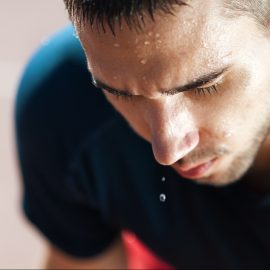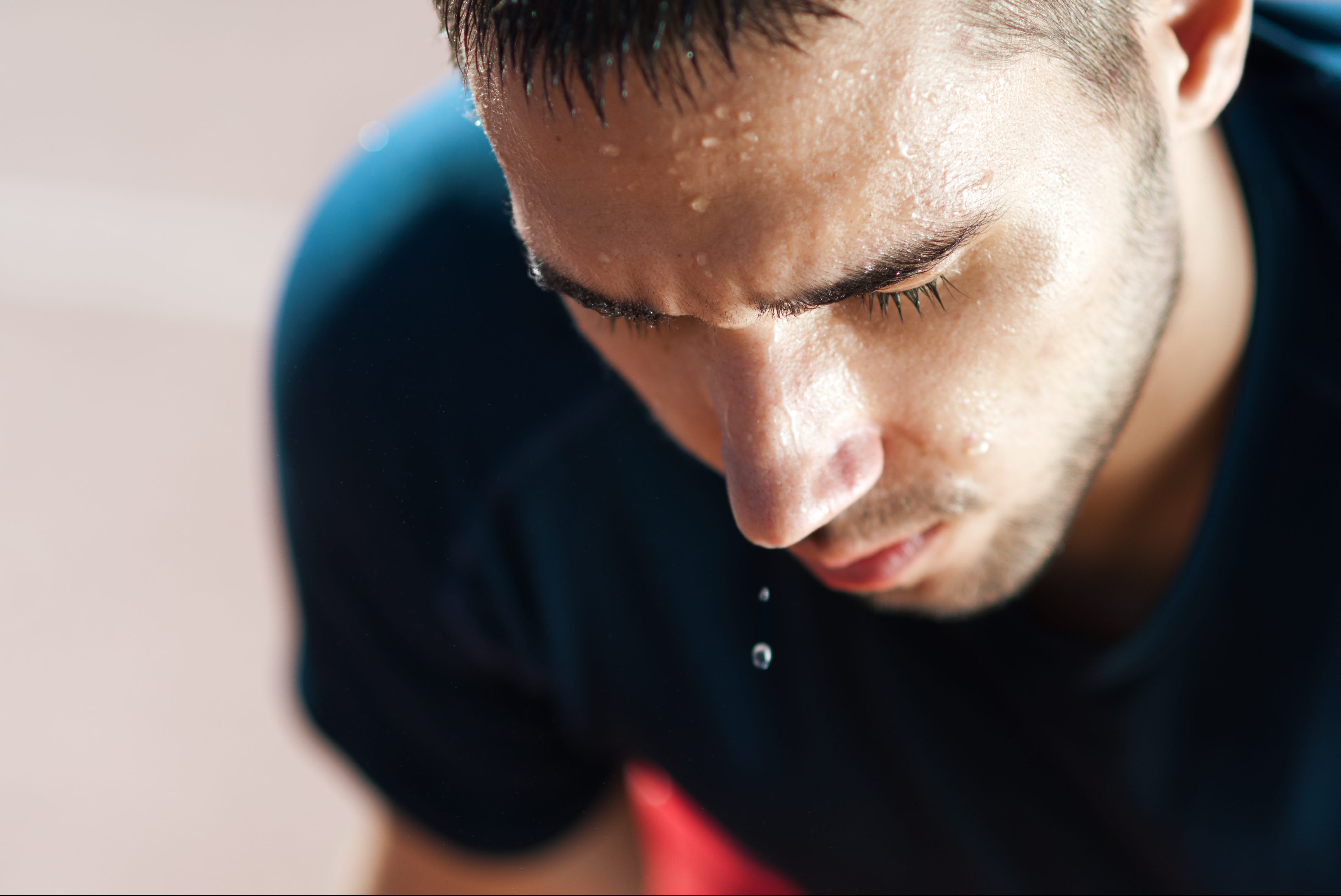Deodorants, antiperspirants, body sprays–people make a considerable effort to hide the fact that they sweat. Sweating is probably not most people’s favorite thing to do, nor do they particularly enjoy the accompanying smell. And, further, I would presume this is not a favorite subject of conversation.
But guess what? We’re going to have this conversation anyway. Because sweat is important. If we didn’t sweat, our health would be harmed in a serious way.
Perspiration or sweating is the production of a fluid, primarily water, as well as various dissolved solids, mostly salts that are excreted by the sweat glands under the skin. Sweat itself is not the cause of body odor, but rather the bacteria on the skin which feed on the sweat.
 In humans, sweating is primarily a means of regulating core body temperature. It’s essentially a cooling system so that our temperature of 98.6 Fahrenheit (or 37 degrees Celsius) doesn’t get too high. Men tend to sweat sooner and more under most circumstances.
In humans, sweating is primarily a means of regulating core body temperature. It’s essentially a cooling system so that our temperature of 98.6 Fahrenheit (or 37 degrees Celsius) doesn’t get too high. Men tend to sweat sooner and more under most circumstances.
People ask me all the time if the amount you sweat when exercising is in anyway a measure of workout intensity. This is possible. But it may just be an indicator of how many sweat glands you are born with.
Everyone is born with between two million to four million sweat glands. Interestingly, women are usually born with more sweat glands than men, but men’s sweat glands are far more active, hence a man’s predisposition to sweating more.
Another factor to consider when exercising is your environment, particularly if you are outdoors. Working out in humid conditions doesn’t cause you to sweat more, but it does prevent the released liquid from evaporating on your skin–a process that releases body heat into the air, helping you stay cool. This is why you feel hotter or may think you sweat more in a humid environment.
If you notice you are sweating excessively without a normal trigger, such as exercise or stress, you may have a condition known as hyperhidrosis. Overactive sweat glands cause sweating at random times.
Certain medications and health conditions–including hyperthyroidism, anxiety and heart problems–can cause excessive sweating as well.
The hormonal fluctuations associated with menopause can produce hot flashes and sweating at inopportune times, often during the night. Interestingly, regular exercise may help reduce the frequency of both night sweats and hot flashes.
Not sweating enough is also a concern because your body is unable to effectively cool itself. This condition, called anhidrosis, may affect the entire body or only specific areas. Neurological conditions, burns and skin diseases are some potential causes. Dehydration is also a possible cause, which is important to consider if you exercise or engage in sport activities. Contact your doctor if you believe your sweating is not normal.
One of the unfortunate outcomes of sweating is, of course, a bad odor. As we previously mentioned, the sweat itself is odorless. The bad smell is a result of bacteria already on the skin that feed off the perspiration.
While body odor is usually associated with the armpits, bacteria can also produce odor in virtually any part of your body, particularly where there is restricted airflow. Thoroughly washing your skin with a wet washcloth and soap–especially those areas prone to sweating–can help prevent body odor.
Remember that smelly feet can also cause smelly shoes. Treating your shoes with an over-the-counter deodorizer can help. Also, wear thick, absorbent socks if you can.
If you want to be “odor-free,” consider the following tips from WebMd:
- Apply an antiperspirant at bedtime. This gives the product a chance to work while you sleep and are not sweating. If you apply antiperspirants after showering in the morning, the sweat you accumulate will wash away the product and render you defenseless againt daytime sweating. Remember, deodorants do not prevent sweating. They mainly mask the smell of the sweat on your skin. Antiperspirants are chemical agents that reduce sweating. Many antiperspirant preparations also contain a deodorant, which helps to mask the smell. Check the product you use to make sure it contains an antiperspirant.
- Keep your underarms dry. Bacteria have a hard time breeding in dry areas of the body.
- Try a solution of hydrogen peroxide and water to fight body odor. Use 1 teaspoon of peroxide (3%) to 1 cup (8 ounces) of water. Wipe this on affected areas (underarm, feet, groin) with a washcloth. This may help destroy some of the bacteria that creates odor.
- Wash your workout clothes often. Sweaty gym clothes are a bacteria-breeding ground.
- Change your diet. Sometimes, fatty foods, oils, or strong-smelling foods such as garlic, curry, and onions can seep through your pores and cause body odor. (Always see a doctor or dietician before making drastic dietary changes).
- Shave your underarm regularly. It will help prevent the accumulation of bacteria and can reduce sweat and odor.
If you have excessive sweating (hyperhidrosis), talk to your doctor. There are a few treatment options for people who need more aggressive treatments. Also, your doctor can diagnose an underlying medical problem that may need to be addressed.
So don’t sweat the sweat–it keeps you cool and healthy.
SWEAT FOR A CAUSE: Run with Team Yachad at this year’s ING Miami Marathon and Half-Marathon. Support people with disabilities. Get inspired by people who already did.
Alan Freishtat is an A.C.E. certified personal trainer and a lifestyle fitness coach with over 17 years of professional experience. He is the co-director of the Jerusalem-based weight loss and stress reduction center Lose It! He can be reached at 02-651-8502 or 050-555-7175, or by email at alan@loseit.co.il.
The words of this author reflect his/her own opinions and do not necessarily represent the official position of the Orthodox Union.

